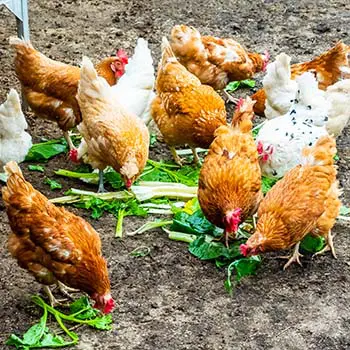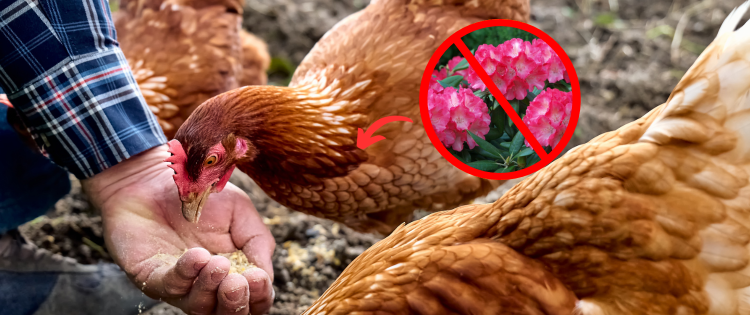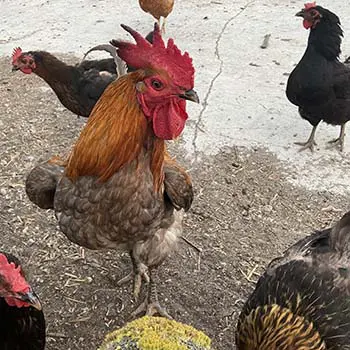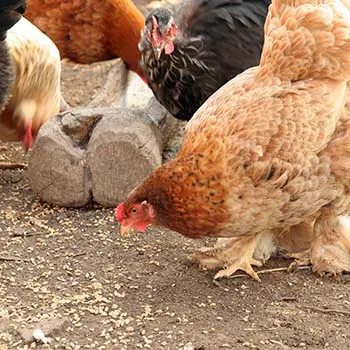Though our chickens roam the world and eat everything growing on it, there are some plants and food items that they really should avoid. In this article, we’ll take a quick look at the best things to avoid and why. Let’s get started.
Vegetables
Though most chickens love vegetables (especially colorful ones), there are a handful that pose a dangerous risk to their health. Perhaps the first one most people think of is avocado. In fact, chickens can enjoy a very small amount of avocado when the pits are removed but we don’t recommend it. The toxicity of avocado to a bird is very high and the amount is very low. As always, when things are risky, it is better to simply avoid it.
Other vegetables you’ll want to avoid are ones that cause large amounts of gas. Chickens are not put together like we are. The majority of their digestion takes place in the crop and the gizzard, grinding and crushing their food in those two organs since they don’t have teeth like we do. Because of this, chickens cannot deal with a large gas load and will often die of bloat or get terrible bouts of stomachache and diarrhea. Both of these can lead to death or long-term discomfort in which the bird will lose condition.
Related: This Could Kill All Your Chickens!
Beans that are frequently dried and stored for human consumption should not be fed in large quantities to poultry. Brassicas should be avoided in large quantities as well because of the same issue. These plants produce a large amount of gas when digested and it is no different for chickens. They simply cannot handle it. Some chickens may even burst on the inside, leading to sepsis quickly and an unfortunate, painful end.
However, a small floret of broccoli (especially cooked) or a handful of beans to a flock will not hurt your birds. A whole avocado split amongst three or four chickens, though, certainly will lead to severe sickness if not death.
Nightshades such as potatoes and tomatoes and all parts of their plants should be avoided. As well, try not to give alliums, either. This includes onions and garlic but is not limited to them. Nightshades will kill your chickens and most alliums will cause liver problems or issues producing red blood cells.
Azaleas and Other Toxic Flowers
We’re starting with flowers because so many people love to see a colorful dinner tray for their birds, especially if it’s the holidays or they want to offer them treats. And, let’s be honest, the chickens really seem to be into the colors and blossoms, too. It’s something of a problem when they approach certain flowers, however, and that can be difficult to discern.
Azaleas are always poisonous. They are for your dogs, cats, horses, sheep, ducks, and chickens. If it’s a living animal, an azalea is not its friend (unless it’s a pollinator, they’re fantastic for pollinators). If you have these bushes and you also have livestock, either someone who lived there before did not have livestock or did not realize just how dangerous azaleas are. Destroy them.
Continuing on the subject of flowers, we all know the damage poinsettias can do, but did you know that there are hundreds of other flowers that are dangerous to you and your poultry? We strongly recommend looking up a complete guide, but here are several: foxglove, bird of paradise, morning glories, daffodils, amaryllis, and wisteria.
Chocolate
This may be an outlier but it is just as important as the rest. Chocolate cannot be absorbed properly by chickens. The same problems that exist for dogs also exist for chickens. If you lose a small piece in the coop and a chicken gets to it before you do, don’t worry about it too much. But don’t throw them extra chocolate birthday cake as a means to get rid of it. You will make your flock very, very sick.
Raw Rice and Other Grains
Lastly, we have raw grains but I want to note that rice can be an issue. A long time ago, people threw uncooked rice over newly married couples to wish them good fortune in the future. This was discontinued in many areas when people noticed the local birds were struggling and dying of bloat in the aftermath of these weddings.
Why does this happen and how can you prevent it in your flock? Let’s break it down.
This happens primarily due to the absorption and par-cooking of expanding grains within the animal’s digestive tract. How does the grain par-cook? Unfortunately, the animal is so warm inside that the grain is encouraged to absorb fluid along the bird’s digestive tract. Simply put, the grains are much smaller when they enter the bird so the bird eats more of them than they should. As the grain expands… well, we’ve all seen what happens with a container of Jiffy Pop, right?
Related: Do This For Your Chickens So They Lay More Eggs
Pop. Kerblooie. That’s your chicken’s insides, except this time it’s not fava beans. It’s rice, and it really isn’t your fault because you didn’t realize it.
If grain is rolled, crushed, or otherwise mauled, it’s usually fine to feed grains to poultry. In fact, if you look at the back of your feed bag, you’ll be shocked at how many grains your chickens are eating on a day-to-day basis. Almost all of a layer pellet is, indeed, grain. But these grains can no longer absorb a bunch of fluid and become a massive health risk for the safety of your flock due to the way they’ve been processed.
Ultimately, if you want to avoid the problem with grains and other connected issues, your best bet is to not feed the grains unless the birds have good reason (and careful monitoring afterward) to have at them. Perhaps you’re trying to put on weight or add girth to a bird, but there is very little reason for that in today’s world.
What have your chickens gotten into that has cost you time and money? Any plants you feel made it here unfairly? Leave a comment down below, we’d love to hear from you!
You may also like:
Native American Remedies That We Lost To History (Video)
15 Things You Should Teach Your Children That Can Save Their Lives













Rice will not make chickens or any other bird explode.. Why are you spreading stuff that just isnt so.. Where are all the dead pigeons and other birds that ate rice after a wedding?? Guess you can’t imagine that Asian poultry producers have been feeding rice to their birds for centuries.. Our chickens prefer rice to anything else. Why they like it right up there next to the nightshades, like tomatoes which they rob off my plants if they can get to them. We feed tomatoes year round with no negative results. Why spread things that arent supported with facts..
We feed tomatoes during the growing season, no negative affects. Stop with the nonsense.
A little of this is true, much is absolute nonsense. Chickens should never be fed tomatoes and it will kill them? Are you serious? Perhaps you mean the green leaves of the nightshade family of plants? If so you need to be specific, because this article implies the actual tomato fruit itself. WRONG! Chickens LOVE tomatoes and devour them like candy, with absolutely no ill effects. We’ve raised chickens for 50 years and if you give them access to your tomato plants…look out! You won’t have any tomatoes left. They’ll devour as many as they can reach.